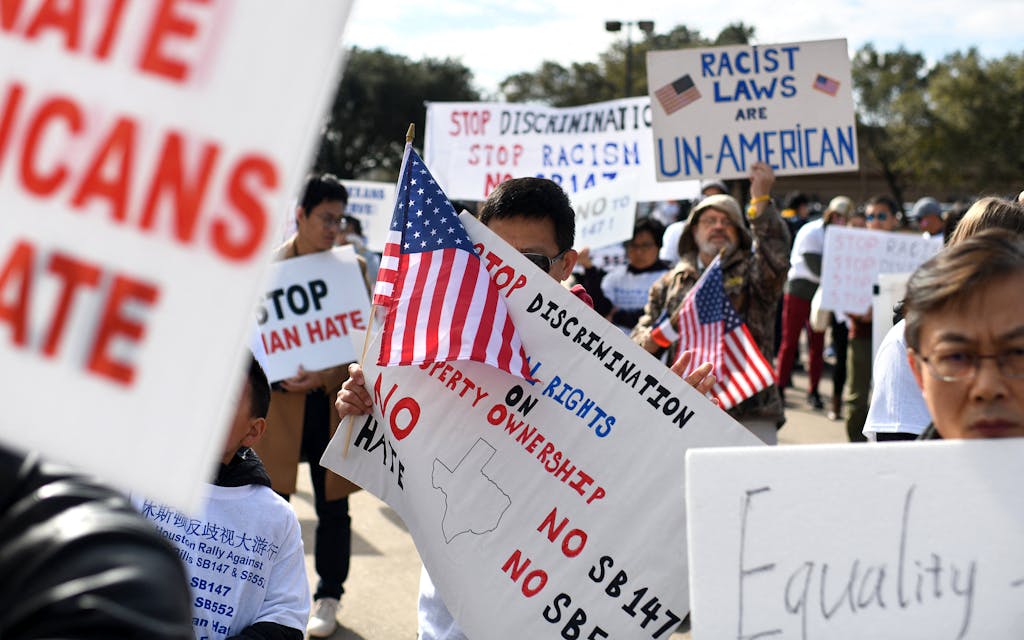It’s an immigrant tale as old as time: Members of a family aspire to live in the United States, so they sell their assets and bring their small fortune to America. They find a good school district for the kids. They’ll rent at first if they have to, but home ownership is a pillar of the American dream. So they find jobs and save up for a down payment, buy a home as soon as they can. In the meantime, they ride out the long journey toward naturalization. Even if they’re lucky, it’ll be years before they become U.S. citizens.
Kenneth Li, who’s been called Houston’s “unofficial mayor of Chinatown,” knows the story well. That’s partly because, as the owner of Southwest Realty Group in Houston, serving one of the city’s most diverse districts, he frequently deals with international clients. But the story is also his own. Li came to the United States on a student visa in 1983. He attended Houston Christian University, not far from where his uncle, also a recent immigrant, was starting an Asian supermarket. Li split his time between school and helping his uncle build the business. “When I graduated, I was waiting for my permanent residence,” he recalled. “At that same time, I qualified for a mortgage to buy my first home.”
Two bills in the state Senate would make stories like Li’s a thing of the past in Texas. The proposed legislation would prohibit the purchase of property not only by Chinese nationals awaiting U.S. citizenship, but also citizens of Iran, North Korea, and Russia. Senate Bill 147, filed in November by Lois Kolkhorst, a Republican from Brenham, would prohibit individuals from those countries of origin—including dual citizens and legal residents of the United States—from buying any real estate in Texas. The prohibition would also apply to “governmental entities” of the four countries, companies headquartered in those nations, and companies “directly or indirectly controlled” by their governments. “The growing ownership of Texas land by some foreign entities is highly disturbing and raises red flags for many Texans,” Kolkhorst said in a press release touting her bill. Last month, Governor Greg Abbott tweeted his enthusiastic support for the measure, boosting its chances of passage.
Senator Donna Campbell, a Republican from New Braunfels, has filed a narrower measure, Senate Bill 552, that would prohibit individuals, companies, and government entities from the same four countries from buying agricultural land in the state. After she filed the bill in January, Campbell said the bill was designed to prevent a “disruption, shut down, or misuse” of the food supply chain by “hostile foreign governments.” What sort of disruption Campbell fears is unclear. Is the worry that foreign owners will stop producing crops? Or that they will export all the food they produce? Answers have not been forthcoming. Texas Monthly asked Campbell’s staff to clarify multiple times and received no response.
Campbell’s bill piggybacks off another she authored in 2021, a few years after Chinese billionaire Sun Guangxin bought up nearly 140,000 acres of land in Val Verde, a Southwest Texas border county that’s home to the crystal-clear waters of the Devils River, a popular fishing destination. Sun, a retired captain of the People’s Liberation Army, planned to use 15,000 of those acres to build a wind farm near Laughlin Air Force Base that could feed into Texas’s electricity grid.
The Lone Star Infrastructure Protection Act (Senate Bill 2116) was designed to stop Sun in his tracks, prohibiting companies based in China, Iran, North Korea, and Russia from entering into contracts involving Texas’s critical infrastructure. And it succeeded, passing with unanimous support, including that of Chinese American State Representative Gene Wu, a Houston Democrat. “I voted for it because it made sense,” Wu said. “It dealt with critical infrastructure—water, power, telecom, things like that.”
But Wu has vocally opposed this session’s bills, arguing that if it’s national security interests the Lege is trying to protect, the 2021 law already accomplished that. “The only thing that this legislation does different than SB 2116 is that it reaches people who don’t have a connection with [a foreign] government,” he said. “Just average, everyday people who happen to also be of the same national origin.”
They’re folks like Wu’s own parents, he said, who settled permanently in the United States when he was four years old. “My parents did not ‘leave’ China,” Wu said. “They fled China.” His father had paved the way for them as a student at the University of Oregon in the city of Eugene, which inspired Wu’s American name. After “Gene” and his mother joined his dad in Odessa, where his dad had gone on to earn a nursing degree at UT Permian Basin, they eventually moved to Houston. His parents rented an apartment for a short while before they bought their family home in Sharpstown, on the city’s southwest side, near Chinatown, for $60,000 in 1986. They didn’t get their citizenship until four years later; Gene Wu was naturalized in 1992. “That same story repeats itself tens of thousands, if not hundreds of thousands, of times across our state, across our nation,” he said. “What does my childhood home have to do with national security?”
The Texas bills come at a time when U.S.–China tensions are especially high. Opponents say the legislation is encouraging anti-Asian hate crimes, which have risen exponentially across the country—including in Texas cities such as Dallas and Houston—over the past few years. “The balloon crap could not have come at a worse time,” Wu said, referring to the recent incident in which a Chinese surveillance balloon was found floating above Montana and was subsequently shot down off the South Carolina coast. “You now have increased hostilities worldwide with China,” Wu said. “At the same time, we have state-sanctioned legislation that says these people are our enemies.”
Asian Americans are the fastest-growing demographic group in Texas, and expected to continue growing nearly four-fold by 2050 to upwards of 12 percent of the total state population. Currently, the state ranks third in the nation with approximately 1.6 million Texans who identify as Asian representing about 5.5 percent of the total population, according to the 2020 U.S. Census. One-fifth of the AAPI population (324,000) in Texas lives in Harris County, which includes Houston. Dallas County has the next highest population with 162,000, followed by Fort Bend County, outside Houston, with 148,000. In 2022, Texas ranked fourth nationally in the number of anti-Asian hate incidents.
Thanks to U.S. antagonisms with China, and the fears stirred in Texas by Sun’s wind-farm proposal, it’s perhaps not surprising that Chinese Americans are being targeted by the Lege. But the choice of other nationalities included in the bills has some scratching their heads. “North Korean and Iranian companies are sanctioned to the moon and back,” said Wu, arguing that the likelihood of a company from either one of those nations purchasing real estate in Texas is virtually nonexistent. Iranian individuals who have managed to come to the United States are often refugees or students—or both. They’re also often some of their country’s best and brightest. When asked why those four specific nations were chosen, Senator Campbell’s communications director, Dan Isett, said that they were the same four nations cited as potential national-security threats in the U.S. Department of Defense 2022 National Defense Strategy.
Several other states are considering legislation similar to what’s being proposed in Texas. For Wu and others, the national-security concerns cited by the bills’ proponents are largely a smokescreen for anti-Chinese bias. “There is this sense,” Wu said, “that Asian Americans are never truly Americans. No matter how long you’ve lived here, no matter how good your English is, no matter how much money you make, you will never be American enough.”
Isett rejected the idea that bigotry lurks behind Campbell’s legislation. “Any claim of racial discrimination in this bill is unfounded,” he said, noting that the legislation is narrowly tailored to address concerns regarding Texas agricultural land. Meanwhile, in the wake of the controversy her bill has stirred, Senator Kolkhorst told Texas Monthly, in a statement, that she plans to amend it to exempt U.S. citizens and permanent residents. “This has always been about commonsense safeguards against Russian, North Korean, Chinese, and Iranian authoritarian regimes,” she wrote, “not those fleeing the tyranny of those governments who seek freedom in Texas.”
Even with those exceptions, Kolkhorst’s bill would still apply to a significant swath of immigrants, including the most vulnerable: asylum seekers. Even if U.S. citizens and permanent residents are exempted, “There’s a lot of people that still would not be allowed to own property for years in the United States because the immigration system is so backlogged and so broken,” said Brandon Roché, a former attorney at the University of Houston Law Center Immigration Clinic who now leads a firm in Denver. “I can think of many instances where Chinese citizens or Russian or Iranian citizens are here trying to flee their own government. And the U.S. is telling them you can’t even buy property for the ten years that it’s going to take you to live here and go through this process.”
Four Republican House members, including Taiwan-born State Representative Angie Chen Button of Richardson, have responded to the Senate bills by floating an alternative. House Bill 1075 would prohibit any foreign government or company directly owned by a foreign government from buying farmland in the state, but would exempt foreign-born individuals legally residing in Texas. “I am well familiar with what happened during World War II to Japanese Americans,” Representative Button said. “This bill eliminates the repetition of that threat without negatively marking loyal Americans of any ethnic background.”
But if you ask Gene Wu, the damage from the Senate bills has already been done, no matter what fate they meet. “You’re using a small minority community as a scapegoat for the world’s ills,” he said. “You’re labeling an entire immigrant community, every single person from that nation, as an adversarial agent. That kind of mentality is what gets people stabbed and assaulted.”

Sharing Wu’s fears, Asian Americans in Texas cities have been rallying against the exclusionary bills. On the second Saturday in February, at a community-organized protest in the heart of Houston’s Chinatown, some five hundred protesters gathered in the parking lot of Sterling Plaza, surrounded by stores and restaurants that bore their names in both English and Chinese, to voice their concerns. Folks wearing ornate costumes performed traditional lion dances to the crash of cymbals. Several political and community leaders attended, including Houston mayor Sylvester Turner; Democratic members of U.S. Congress Al Green, Sheila Jackson Lee, and Lizzie Fletcher; and state representative Wu. On the outskirts of the rally were booths where attendees could register to vote, write postcards to the Legislature (or sign prewritten cards), and sign a petition opposing the two bills.
A 23-year-old man, who declined to give his name for fear he would become targeted, said, “I think SB 147 and SB 552 are unfair and represent discrimination in the name of national security. They betray the core values of America.” The recent college graduate, who was born in China and moved to the U.S. with his family when he was 14, added, “I thought Texas was open and friendly. If this passes, I would have to consider leaving Texas, and even America. I’m an American citizen, but racism doesn’t look at your status, it just looks at your face.”
Tuo Li, a 23-year-old Navy veteran who was born in China, wore a black cowboy hat, boots, a big belt buckle, and a bolo tie. He held a copy of the U.S. Constitution. Li immigrated a decade ago and is now a U.S. citizen thanks to his military service. “This is Chinatown,” he said. “If this bill gets passed, many of these businesses will move somewhere else, which will hurt the economy and the community.”
Asian Americans’ economic impact is outsized. They are better educated than Texans overall, with 61 percent who are 25 years and older holding a bachelor’s degree or higher, compared with 31 percent of the total state population. They tend to be highly entrepreneurial: in 2018 (the most recent year studied), there were more than 51,000 Asian-owned businesses in Texas, with nearly 445,000 employees and more than $14 billion in payroll. Asian Americans are regarded as especially vital to industries including engineering, IT, and medical care and research. Approximately 8.4 percent of Texas’s health care workers are Asian American and Pacific Islander (AAPI), and one in seven physicians and surgeons are AAPI immigrants. They represent the kind of talent that Texas is “desperate for,” said Chelsie Kramer, the state organizer for the American Immigration Council. Between 2017 and 2021, she noted, job postings in Texas for general physicians have increased by 52 percent, anesthesiologists by more than 71 percent, and obstetricians by 79 percent.
If the Asian American talent pool is attenuated by bills like Campbell’s and Kolkhorst’s, Kramer said, it would be a blow to the state. “Policies that restrict immigrants from buying property and planting roots are not going to help Texas attract the talent and workforce Texas needs,” said Kramer. “Can you imagine having a nurse or doctor save your life and then finding out that your state won’t allow him or her to purchase a home to raise their children in?”
While the fates of the Senate bills remain uncertain, the real-estate sector is already feeling the impact on business. In Houston, Kenneth Li said potential buyers have expressed anxiety in response to the bills. “I have people calling me from California, saying, ‘If that’s true, I’m not going to move to Texas. It’s a terrible place. Do they have a KKK? Are we going back to the old days?’ ”
Cecilia Hampton, the founder of Hampton International Realty Group, based in the Dallas suburb of Frisco, said that in response to the bills, multiple prospective buyers are backing out of their contracts—particularly those purchasing homes in new developments. In one Austin subdivision alone, Hampton said, at least seventeen clients, several of whom are in the process of applying for green cards, are terminating their contracts. Because closing the purchase contract on a “new build” happens only once the house is finished—a process that typically takes between eight and twelve months—these prospective buyers are worried that they won’t be able to legally buy their homes in time.
“What if the bill passes and the home is not finished?” said Hampton, who is a green-card holder from China. “The bill, if it passes, will become effective by September this year. Their homes will not be completed by September.” It’s created a real mess, she said, not just for the buyers but also for the builder. “They feel helpless because they feel like they have to refund their earnest money,” she said.
Sixue Chen, who’s in the U.S. on a visitor visa and hails from the Sichuan province of China, is one of those considering terminating her contract. With Hampton helping to translate, Chen told me that she and her husband, who had previously studied architecture at Columbia University, had hoped to move to the United States for jobs. Texas, with its wide-open spaces to build, is a dream for a budding architect like him. When the couple caught wind of the Senate bills, they had just received their permit from Austin to start building a home in a new housing development. Even if their home can be constructed and they can close their contract by September, which is unlikely, Chen and her husband would be prevented from purchasing property in the future—at least until they became citizens.
“I feel really bad,” said Chen. “We already planned to come here and live here and now we have to plan again because of this.” She and her husband are considering a move to Oklahoma or North Carolina instead.
Roché said that the prohibition on property ownership by certain immigrants could make it harder for them to apply for green cards through marriage, since shared assets are a key way to prove that a couple is living together. “It would make things more difficult if they’re not on the deed,” he said.
Dawn Lin, a Houston-based title insurance attorney and the founding president of the Asian Real Estate Association of America’s chapter in Houston, expressed another concern that the bills don’t address: How exactly will the law be enforced? Through racial profiling? “When we do closings, we ask people to provide us with a valid driver license,” she said. “Can we look at this person and say, ‘Well, you don’t look white. I need to see your citizenship.’ Do we play the role of the police?” Neither of the Senate bills makes any mention of how the laws would be enforced. (Neither Campbell nor Kolkhorst, nor any of their staffers, responded to questions about enforcement mechanisms.)
If one or both of the Senate bills pass into law, Wu and other opponents have vowed to mount court challenges. Roché was skeptical about the ultimate success of such lawsuits, whatever their merits. “I’m not sure it’ll pass constitutional muster,” he said, “although with the current Supreme Court, I’m not sure about anything.”
Michael Hardy contributed reporting to this story.
- More About:
- Politics & Policy
- Texas Legislature
- Houston








